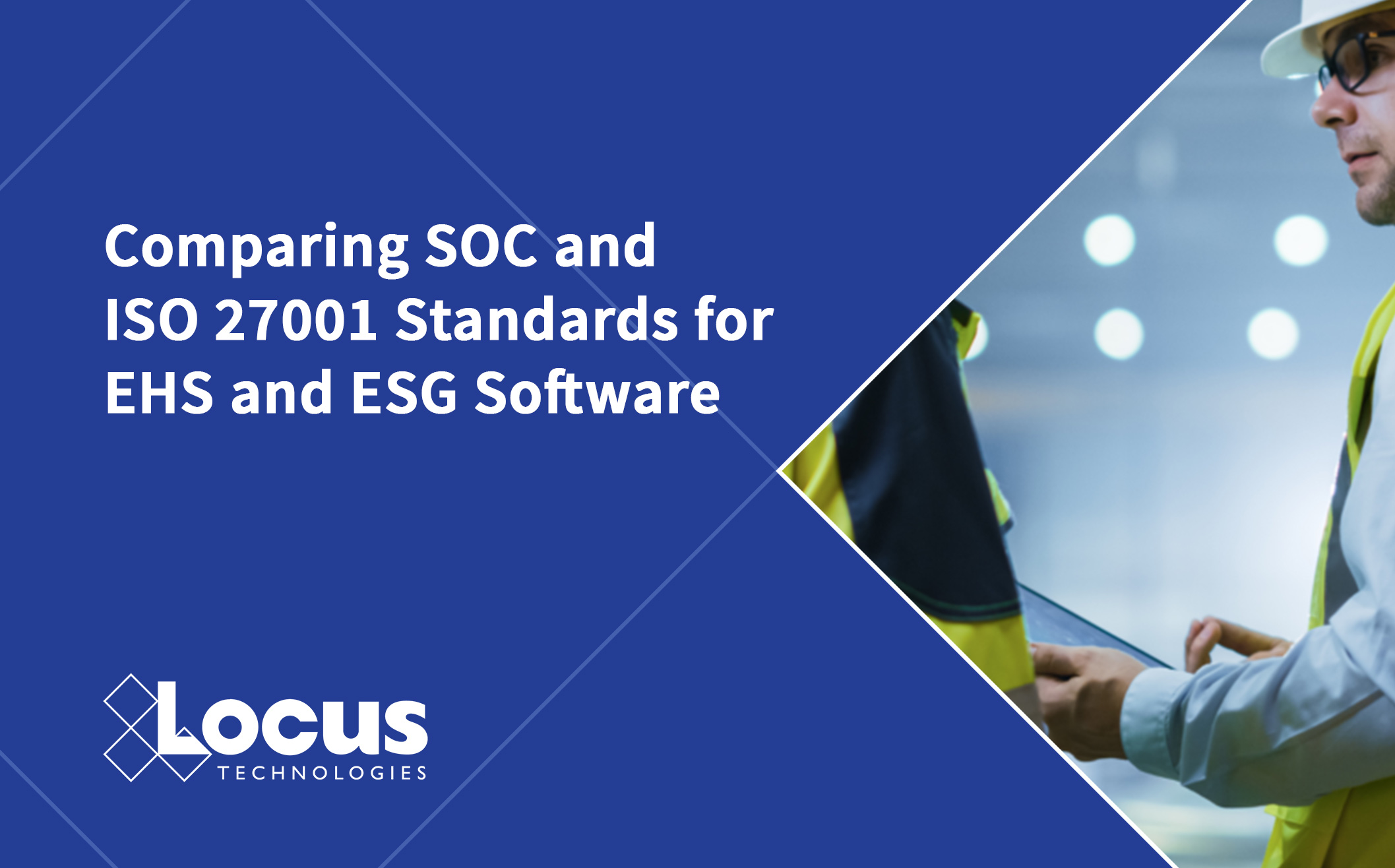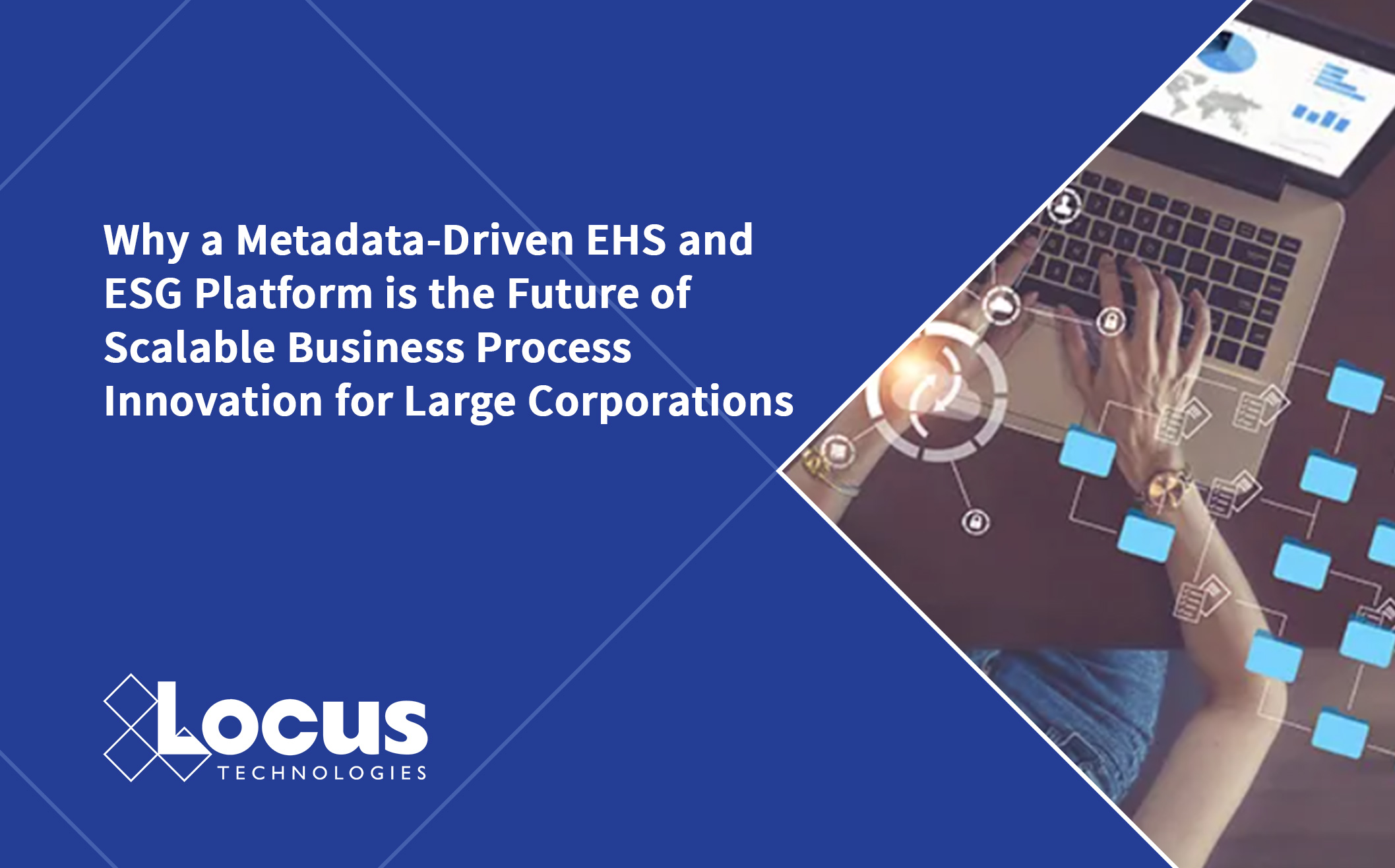Comparing SOC and ISO 27001 Standards for EHS and ESG Software
By Staff Writer, Reviewed by Tomas Mestan, Director of IT

Reading Time: 4 minutes 33 seconds
In today’s regulatory and risk-conscious environment, organizations that provide Environmental, Health, and Safety (EHS) compliance software and Environmental, Social, and Governance (ESG) reporting platforms must demonstrate robust information security and operational controls. Two of the most recognized frameworks for this purpose are the System and Organization Controls (SOC) reports (particularly SOC 1 Type 2 and SOC 2 Type 2) and the ISO/IEC 27001 certification.
While both serve to validate an organization’s commitment to security and compliance, they differ in scope, methodology, and applicability. This article explores these differences and outlines why Locus Technologies has invested in SOC 1 and SOC 2 Type 2 standards to underscore its operations and its EHS and ESG software.
SOC Reports: An Audit-Driven Approach with International Acceptance
SOC 1 and SOC 2 reports are governed by the American Institute of Certified Public Accountants (AICPA). They are designed to provide assurance over internal controls relevant to financial reporting (SOC 1) and over controls related to security, availability, processing integrity, confidentiality, and privacy (SOC 2).
- SOC 1 Type 2: Focuses on controls relevant to financial reporting. It is particularly important for software platforms that impact clients’ financial statements, such as ESG reporting tools that feed sustainability financial disclosures.
- SOC 2 Type 2: Evaluates the operational effectiveness of controls over a defined period (typically 6–12 months) across the Trust Services Criteria. This is critical for EHS platforms like Locus that manage sensitive operational data, ensure uptime, and protect against breaches.
Both reports are attestation-based, meaning they are issued by independent auditors who assess the design and operating effectiveness of controls.
Several ESG and EHS software companies claim to have SOC 1 and SOC 2 verifications, although they are often referring to the attestations held by their hosting provider. Conversely, Locus Technologies maintains valid, 3rd-party attestations of its own financials, operations, and security protocols – not just those of its hosting provider.
ISO/IEC 27001: A Management System-Based Standard with Global Reach
ISO 27001 is an international standard for information security management systems (ISMS). It provides a framework for establishing, implementing, maintaining, and continually improving an ISMS. Certification is granted by accredited bodies and demonstrates that an organization has a systematic approach to managing sensitive information.
Key characteristics of ISO 27001 include:
- Risk-based approach: Organizations identify and treat information security risks based on their specific context.
- Continuous improvement: Emphasis on the Plan-Do-Check-Act (PDCA) cycle.
- Leadership commitment: Budget and resources are prioritized at the highest levels.
| Feature | Combined SOC 1 Type 2 & SOC 2 Type 2 | ISO/IEC 27001 |
|---|---|---|
| Scope | Organization financial reporting (SOC 1) and system-level controls (SOC 2) | Organization-wide Information Security Management System (ISMS) |
| Assessment Type | Independent attestation of control design and operating effectiveness over time | Formal certification of ISMS with ongoing surveillance audits |
| Focus Areas | Specific systems and controls (e.g., data integrity, availability, confidentiality) | Governance, risk management, leadership, and continuous improvement |
| Timeframe | Evaluated over a defined period (e.g., 6–12 months); evaluates control effectiveness | Continuous, with annual reviews and recertification every 3 years |
| Standard Owner | AICPA (U.S.-based) | ISO (International Organization for Standardization) |
| Geographic Relevance | Primarily recognized in the U.S. and North America; widely used in financial and tech sectors | Global recognition and applicability |
| Evidence of Leadership Commitment | Not explicitly required by SOC, although Locus invests in IT leadership and annual 3rd party audits | Required, Top management must demonstrate active involvement |
| Commitment to Continuous Improvement | Not required or assessed; SOC reports reflect a snapshot of control effectiveness during the audit period. Locus’s annual audits help demonstrate continuous commitments | Required, forward-looking; PDCA cycle and corrective actions are integral |
SOC 1 Type 2 and SOC 2 Type 2 for EHS and ESG Software
As you can see, there is quite a lot of overlap between the SOC and ISO standards and principles. While both programs demand similar investments in terms of responsible operations, strategic commitments, and resources, they also incur their own significant costs for the subsequent audits and attestations. At Locus, we chose to allocate our audit funds to one set of standards: SOC.
For large organizations evaluating Locus for EHS compliance and ESG reporting software, the combination of SOC 1 Type 2 and SOC 2 Type 2 reports provide a comprehensive and practical assurance framework. Here’s why:
1. Alignment with Financial and Operational Risk
- ESG reporting software often feeds into financial disclosures, making SOC 1 Type 2 essential for validating controls over financial data.
- EHS platforms manage operational risk, safety incidents, and compliance data, areas directly addressed by SOC 2’s Trust Services Criteria.
2. Depth of Control Testing
- Locus Technologies’ SOC 1 and SOC 2 Type 2 reports assess both the design and operating effectiveness of controls over a defined period, offering strong retrospective assurance.
3. Audit-Ready Documentation
- SOC reports are widely accepted by auditors and regulators, especially in the U.S., and are often required during vendor risk assessments and due diligence processes.
4. Targeted for North American Requirements
- Locus has a heavy concentration of North American-based customers, including US government entities with mature internal control environments, well suited to SOC standards.
5. Client and Stakeholder Expectations
- Many enterprise clients explicitly request SOC 2 Type 2 reports as part of their vendor onboarding and annual review processes. The inclusion of SOC 1 Type 2 further strengthens trust in Locus Technologies’ financial data integrity.
Conclusion
Both SOC and ISO 27001 frameworks offer valuable assurance, but they serve different purposes. For large organizations evaluating EHS compliance and ESG reporting software, SOC 1 Type 2 and SOC 2 Type 2 reports provide rigorous and relevant assurance of both financial and operational controls. These reports not only meet the expectations of auditors and stakeholders but also demonstrate a mature approach to risk management and data protection, both of which are critical in today’s compliance-driven business environment.
While there is clearly value in ISO 27001 standards and commitments, Locus Technologies’ decision to invest in the rigorous SOC 1 Type 2 and SOC 2 Type 2 standards has met the needs of clients across more than 1.25 million locations worldwide.
Locus is the only self-funded water, air, soil, biological, energy, and waste EHS software company that is still owned and managed by its founder. The brightest minds in environmental science, embodied carbon, CO2 emissions, refrigerants, and PFAS hang their hats at Locus, and they’ve helped us to become a market leader in EHS software. Every client-facing employee at Locus has an advanced degree in science or professional EHS experience, and they incubate new ideas every day – such as how machine learning, AI, blockchain, and the Internet of Things will up the ante for EHS software, ESG, and sustainability.



